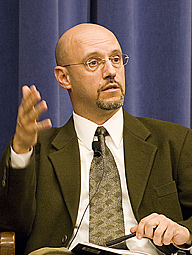Berkeleyan
Obituary
Alex Farrell
![]()
23 April 2008
Alexander E. Farrell, an associate professor in the Energy and Resources Group who worked closely with state government over the past year to chart a course to reduce California’s carbon emissions, died last week at his home in San Francisco. He was 46.
 Alex Farrell (Jeffery Kahn photo) |
Farrell, who joined the Berkeley faculty in 2003 and became director of the campus’s Transportation Sustainability Research Center in 2006, was recognized internationally as a leading expert on transportation fuels and the role of transportation in climate change. His research interests included biofuels, hybrid-electric vehicles and hydrogen vehicles, the low-carbon fuel standard, and transportation sustainability.
“He was one of the leading lights in the area of low-carbon fuels and energy systems, and his career was on a dramatic rise,” said colleague Dan Kammen, professor in the Energy and Resources Group and of public policy, who helped recruit Farrell to Berkeley and co-authored many papers with him, including a just-released report on plug-in hybrid vehicles. “The trajectory of his career and his contributions were both impressive. Alex was a great mentor to the graduate students in the group as well as to students from across campus working on energy and sustainability.”
As an example of the great demand for Farrell’s expertise, he was due to testify at a legislative hearing in Minnesota on April 15 on a possible low-carbon fuel standard for that state, Kammen said.
Most recently, Farrell was the coordinating lead author of a chapter on transportation for a major study for the state on how California can implement climate-change policy through the use of state and local policies, and on the role in this effort of technological innovation in transportation. This report from the state’s Economic and Technology Advancement and Advisory Committee was submitted to the California Air Resources Board in February.
Last year, Farrell and Daniel Sperling, director of UC Davis’ Institute of Transportation Studies, led two collaborative studies for the state, providing the first-ever blueprint for fighting global warming by reducing the amount of carbon emitted from transportation fuels.
“That report, commissioned by Gov. Schwarzenegger, has had a huge impact,” Sperling said. “It is being used as the basis for California’s low-carbon fuel standard and by an expanding number of other states and countries, including the European Union.”
During the preparation of those studies, Farrell’s management role, which included consultation with constituencies ranging from environmental and government organizations to electricity and oil companies, was “indispensable,” Sperling said. “He was a fabulous partner, collaborator, intellectual leader, and emerging superstar. His death is sad and devastating personally, and professionally it is a huge loss.”
Last year, Farrell was asked to join The Roundtable on Sustainable Biofuels, a new international panel of environmental, energy, economic, and cultural experts, to develop standards by which nations and consumers can judge biofuels and their impact on the environment and society. According to Jason Mark, program officer for The Energy Foundation in San Francisco, Farrell was to be asked this week to head a new group to develop national low-carbon fuel standards similar to California’s.
He also served on advisory committees for the National Academy of Engineering and the National Science Foundation and was a consultant for various public and private organizations.
Born Jan. 1, 1962, in Miami, Fla., Farrell was raised in New Jersey and graduated from the U.S. Naval Academy at Annapolis in 1984 with a degree in systems engineering. He served in the Navy as an engineer aboard nuclear submarines from 1984 to 1989, and subsequently worked in private industry before receiving his Ph.D. in energy management and policy from the University of Pennsylvania in 1996, where he served for another year as a lecturer.
In 1997, Farrell was appointed a research fellow of the American Association for the Advancement of Science and then received a yearlong postdoctoral fellowship at Harvard University’s John F. Kennedy School of Government. In 1998 he joined Carnegie Mellon University as a research engineer in the Department of Engineering and Public Policy, and from 2001 to 2003 served as executive director of the Carnegie Mellon Electricity Industry Center. He became an assistant professor of engineering and public policy at Carnegie Mellon before joining the Berkeley faculty. At this campus he also was co-director of the Pacific Region Combined Heat and Power Applications Center.
Farrell published more than two dozen peer-reviewed papers on energy and environmental-policy topics in journals such as Science, Environmental Science & Technology, Environmental Research Letters, and Energy Policy.
“Alex was brilliant, energetic, supportive, insightful, and caring, and he had a way of challenging his colleagues and students to think more critically even when they thought they already were,” said Tim Lipman, a Berkeley colleague and the founding research director of the Transportation Sustainability Research Center. “His career had reached a point where his loss is an enormous one, not just for the Energy and Resources Group and the transportation center but for the global transportation and energy community as well.”
Farrell is survived by his mother, Alice Farrell, of Harrisburg, Penn.; brothers Mark of Portland, Ore., and Brian of Portland, Maine; his sister, Beth Ann Connolly of Harrisburg; two nieces, and a nephew. His father, Edward Farrell, died in 2006.
In lieu of flowers, the family requests that contributions in Farrell’s memory be made to the Alex Farrell Memorial Scholarship Fund, Energy and Resources Group, 310 Barrows Hall #3050, Berkeley, CA 94720-3050. Checks should be made out to “Regents of the University of California.”
— Robert Sanders

